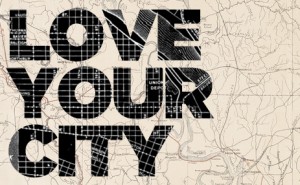 The Resurgence is running a slightly expanded blog I wrote a while back on 4 Ways to Love Your City. It’s a timely arrival with the two vision messages I’m preaching through on Renewing the City at Austin City Life.
The Resurgence is running a slightly expanded blog I wrote a while back on 4 Ways to Love Your City. It’s a timely arrival with the two vision messages I’m preaching through on Renewing the City at Austin City Life.
Tag: city theology
Thinking Well About your City
Eric Swanson is speaking on cities this morning. Drawing from Kevin Lynch’s Image of the City, he avers that we should understand contours of our cities in order to renew it. Five areas to fill in.
- Paths – streets, walkways, transport
- Edges – boundaries that shape the city landscape
- Districts – neighborhoods
- Nodes – gathering points in the city
- Landmarks – clearly marked areas
Do you know your city? Do you know how to engage the nodes and districts in order to renew it. Or are we haphazzardly on mission? How can we make a sustained social and cultural impact in our cities?
Check out Kevin Cawley’s talk right now for more nuts and bolts on this topic.
In the City, for the City
This ABBA video captures some of the city renewal and kingdom momentum in Austin, Texas.
Urbanolatry: Repenting to Learn from the Country
Much has been made of the “City” of late. On the global scale, over half of the world’s population inhabits cities and urban migration is on the rise. Stateside, burgeoning New Urbanism coupled with a minority of urban-focused evangelicals is generating a growing interest in urban life. The new urban mantra is: “live, work, and play in the city.” Austin is on its way to creating this kind of downtown environment.
I am definitely for the city. I really enjoy living in the pulse of the city–the community, the culture, the crud. It is enlivening and alarming, a reminder that heaven has not yet quite become earth! It’s also a great opportunity to participate in renewing and redeeming the brokenness of the city. As pastor Austin City Life, I get to redemptively engage the peoples and cultures of Austin with a missionally-minded community. Yet, in all of this urban living, working, redeeming, and playing, I sense a certain city-olatry, the worship of the city. People love their cities, even to a fault. Certain evangelicals have become so city-focused that concern for rural areas is falling to the wayside. Some have even argued that the expansion of urban slums is a positive economic development (and maybe it is), but in all this urbanolatry we do well to pause and learn from the rural, from the culture of the country.
In his thoughtful essay on tobacco, Wendell Berry lists the benefits of tobacco production. Among them is the practice of “swapping work.” Tobacco, Berry points out, is a very “sociable crop,” one that calls upon the entire community for help in the setting, cutting, stripping and harvesting of tobacco. He comments:
At these times, neighbors helped each other in order to bring together the many hands that lightened work. Thus, these times of hardest work were also times of big meals and much talk, storytelling and laughter.
I was struck by what we can learn from this country culture, from tobacco harvesting outside city limits. In the city, especially among knowledge workers, when a workload increases community declines. People buckle into the cubicle or office for days, only to emerge an angry, tired mess. Berry recounts a community increase with hard work, more laughter and meals. Urban work deadlines bring about despair, less meals, less sleep, and less time at home with the family. Far from enriching community, urban work isolates individuals from co-workers and families.
It would appear that the city has much to learn from the country. Perhaps some repentance from urbanolatry is in order. A little humble pie for us urban dwellers and an opportunity to digest some rural wisdom, “work swapping” could take us a long way in cultivating community, in renewing the city.
